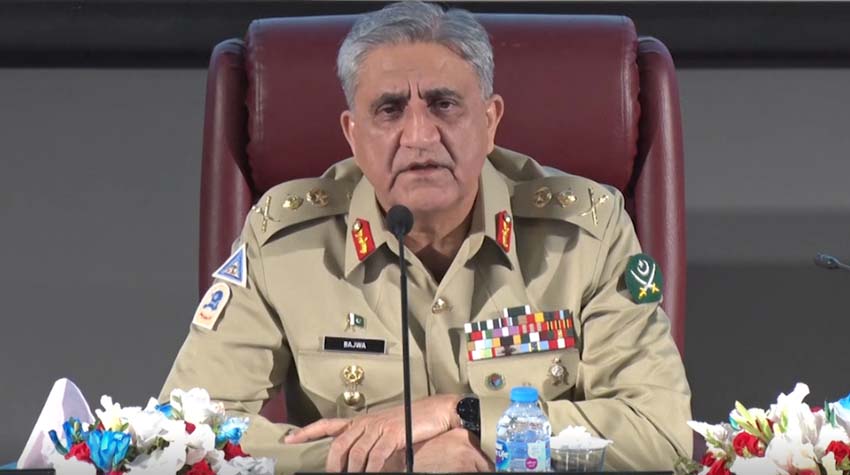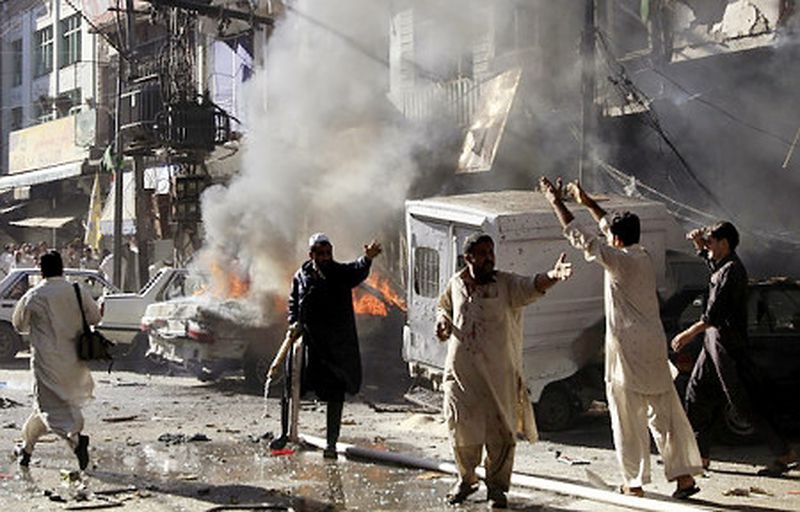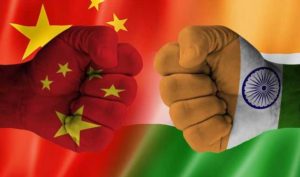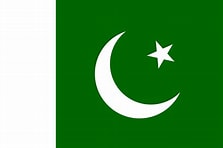The Inaugural speech of Islamabad Security Dialogue, a seminar on National and Regional Security, Pakistan army chief Gen Qamar Bajwa delivered what can only be considered a truly statesman like speech to an audience that sat mesmerised. So, profound and stirring was the talk, that it left many wondering if it was the real Bajwa or a soliloquy on a stage by a thespian.

Although the audience comprising of top leaders, media, military top brass, diplomats and Law Makers were just a few hundred in number, the message was meant for a larger worldwide virtual gallery and for its immediate neighbours, in particular, India.
Not surprisingly the reaction to the speech has been muted and desultory. And the reason is not far to seek. Bajwa is not a thinking General to be taken too seriously. Other than donning starched Khakis he has had no scholarly credentials that sets him apart from many of his notorious predecessors. His address peppered with erudite quotes have left many bewildered, still trying to figure out, if it was really Pakistan army chief or a hand manipulated dummy of a ventriloquist. The General himself in his new avatar looked irrepressible, masquerading as a national leader with a vision. Not since Pompey, the greatest Roman General and Statesman ever, has the world heard a more prescient man in uniform speak with such clarity and foresight. However, the sophistry of his words didn’t match his persona.
One thing is clear. The speaker may have been General Bajwa but the script is definitely not his. The talk generously spiced with modern management lingo and diplomatic jargon sounded very civilised, a far cry from his earlier crude rhetoric warning India of serious consequences on Kashmir. Bajwa’s speech was laced with so many pearls of wisdom that even he must have felt embarrassed when invited to deliver the address. The authorship of the document must have emanated either from some US Think Tank or overseas Pakistani intellectuals from the West.
Let us now breakdown the contents of the speech and analyse. Broadly, Bajwa’s focus was on setting up a new regional order, mainly Asia centric. He dwelt on geo-politics, diplomacy, security, humanity, poverty and economy of the region. It was a potpourri of every aspect of Nation building. He talked about establishing connectivity between nations for ‘stability and developmental orientation’ and investment on multi-layered security environment meaning global, regional and domestic. Pitching for technological advancement Bajwa decried wars leading to destruction. He strongly advocated a positive approach through dialogue and conflict resolution.
All such visionary statements coming from Bajwa was like ‘the devil quoting the scriptures’. Such incongruous homilies were inconsistent with his crude rants against India.
Amid the scholarly discourse one heard the jarring discordant note when he handed a veiled warning to India to come to the table and settle outstanding disputes most importantly, Kashmir. Having failed on earlier occasions after laying down preconditions for talks, he realised its futility. This time it was in a sobering tone that he underlined that Indo-Pakistan relationship is key to ‘connectivity between East and West Asia’ and to ‘unlock the potential between Central and South Asia.’ He strongly advocated a ‘multilateral global and regional approach and cooperation to overcome challenges.’
 Such farsighted vision from Pakistan is really heart-warming given the kind of bitterness that presently exists between the two nations. Just as everyone thought that Pakistan had changed its outlook on Indo-Pak relations, he reverted to his pet theme of invoking long standing Kashmir issue and threw the ball in India’s court to resolve the tangle. Bajwa repeatedly mentioned how Pakistan’s strategic location was so vital both from military and trade points of view. He conveniently forgot to mention how for decades Pakistan had managed to leverage this locational advantage to milk NATO and the US to build its own military and line their own pockets with green bucks.
Such farsighted vision from Pakistan is really heart-warming given the kind of bitterness that presently exists between the two nations. Just as everyone thought that Pakistan had changed its outlook on Indo-Pak relations, he reverted to his pet theme of invoking long standing Kashmir issue and threw the ball in India’s court to resolve the tangle. Bajwa repeatedly mentioned how Pakistan’s strategic location was so vital both from military and trade points of view. He conveniently forgot to mention how for decades Pakistan had managed to leverage this locational advantage to milk NATO and the US to build its own military and line their own pockets with green bucks.
Ironically Gen Bajwa laments, that as most impoverished regions, we continue to spend huge amounts on defence expenditure which should instead be spent on development. He emphasized on regional cooperation to eliminate terrorism and boost economy by appealing to all nations including India and the US.
However, realities on ground are in total variance from the lofty ideals that Pak Army Chief professed. As recently as on 7th September last year Bajwa had warned India that Pakistan would win the fifth generation ‘Hybrid War’ and India stood no chance against a twin attack from both China and Pakistan. Pakistan had been maintaining a steady belligerent stand against India and was actively supporting cross border terrorism in Kashmir.
India on its part, repeatedly has made it clear that terrorism and peace talks cannot go hand in hand. Post August 2019, the political equation has altered in Jammu and Kashmir. Jammu and Kashmir is now an undisputed territory and there is nothing left to discuss except return of POK and Northern areas of Gilgit-Baltistan to India.
Stung by this sudden development Pakistan is badly cornered and looking for an honourable exit from the messy situation it is in.
It has received little support from the Islamic countries who have refused to discuss Kashmir, calling it a bilateral issue between India and Pakistan. So, what has compelled Pakistan now to realign its position and adopt a diplomatic and a matured approach. Also, how genuine is the change of heart?
Is Pakistan fighting a survival war with its back to the wall. Judging by developments in the past two years, it appears so.
Pakistan is facing the worst survival crises in its seventy-four-year history. It is politically unstable, ethnically divided, dominated by the clergy and economically debt-ridden. It has two staunch enemies on its East and the West. The economy is in disarray and inflation is into double figures. Barring China Pakistan has no friends and is badly isolated. It is the hub of terrorism with very few countries wanting any kind of relationship with it. It is no secret that Pakistan is financially bankrupt. FATF has continued to place Pakistan on its Grey List rating. There seems no reprieve in the near future.

A badly cornered Pakistan seems to have realised that for it to exist it has to mends its ways. As a first step it has to abjure violence and do all it can to convince the world that it will walk the talk. Pakistan has a lot of mess in its backyard to be cleared. It has to dismantle the terror apparatus and bring to justice those masterminds who are responsible for massacre of innocent lives in India and are now enjoying sanctuaries on its soil. India’s message is loud and clear – ‘For resumption of talks act now.’ Then alone talks can begin.
Policy followed by India under UPA of having talks simultaneously along with people to people cultural interaction through Cricket, Bollywood and Aman Asha initiatives will not work anymore. A complete cut-off of all activities including trade and culture has hurt Pakistan badly.
On the other hand, cessation of these activities has not even remotely impacted India. Pakistan which unconvincingly claims itself to be a democracy has used Bajwa as a mouthpiece for its outreach. Perhaps this may be a very calculated move given the low credibility that Pakistan’s politicians enjoy and also because the power centre rests at GHQ Islamabad.
But why is Bajwa, in the vanguard of country’s foreign policy. After all he is just an Army Chief of a country wedded to democracy. Reminds me of an incident in the Indian epic of Mahabharat, where Krishna asks Yudhister to announce that Ashwattama is killed, to falsely convey to the invincible Dronacharya that his son is dead. Actually, it was an elephant by name Ashwattama that Bhima had killed. Dronacharya is grief-stricken and drops his arms thinking his son has been slayed. and gets killed. Why did Krishna advise Yudhister to make the announcement? It is because as a righteous King Yudhister was an epitome of truthfulness. Everybody would believe his words. But Bajwa is no Yudhister. This analogy is only to put things in context.
So what is the pragmatism that has driven Pakistan to reset its policies.
 First, the Indian foreign policy has shifted its sights on China. India perhaps has demonstrated that confrontation is always with equals. Pakistan is a now a lackey of China and has diluted its relevance. India’s deft handling of China’s misadventure in the Galwan valley has shown that India can only be engaged by position of military strength, economic power and political clout. Pakistan, vis a vis India none of these.
First, the Indian foreign policy has shifted its sights on China. India perhaps has demonstrated that confrontation is always with equals. Pakistan is a now a lackey of China and has diluted its relevance. India’s deft handling of China’s misadventure in the Galwan valley has shown that India can only be engaged by position of military strength, economic power and political clout. Pakistan, vis a vis India none of these.
Secondly, Pakistan knows that it is impossible to prevail upon India to reverse status in Kashmir. Pakistan is simply in no position to dictate to India any precondition for normalisation of relations.
Thirdly, new White House administration needs Pakistan support to bring closure to the Taliban migraine. But it can’t arm-twist India to toe its line. So, the easier route would be to placate Pakistan to mend fences with India.
Pakistan also realised that over reliance on China may not be sustainable in the long run. CPEC has run into serious trouble. Insurrection in Balochistan and corruption in infrastructure projects of CPEC has left China fuming. Most of these projects are financed by private Banks in China who are not happy with the progress and the future looks gloomy.
So, considering all these factors it is possible that Pakistan seems to be reconciled to the idea in favour of a sincere dialogue with India which is gradually emerging as a rival to China both economically and militarily. But Bajwa may not be the best salesman to push the idea. However, in the absence of any alternative it is a gamble Pakistan has been compelled to take and may be testing waters.
But India may not bite the bait in a hurry. There has been no official reaction yet from our mandarins. The swing in Pakistan’s Foreign policy seems too extreme for any Govt to engage. Unless Islamabad demonstrates its sincerity through positive initiatives on ground, the whole theme may just be another academic get-together over some nice lunch








A well analysed and pertinent article, Sir, which lays down the truth, scattering away from the chaff. Bajwa appears to have written his speech in Urdu to deliver it in English. Obviously, his own understanding of his own speech is specious, to say the least! Pakistan has realised that it is in trouble, caught between a rock and a hard place. The Taliban will not allow Pakistan to close down the terror factory. The ISI will hinder and attempt to shut down its operations. The Generals will bite at the reins that attempt to close down their legally arrived at business profits, what to talk about the illegal ones. Chinese support appears to be waning, though the Chinese are unlikely to leave without getting back on their investments. Pakistan is in a quagmire. Bajwa’s message may be an SOS, albeit only to himself.
I am not sure where you’re getting your information,
but good topic. I needs to spend some time learning much
more or understanding more. Thanks for fantastic info
I was looking for this info for my mission.
It’s truly very complex in this full of activity life to listen news on TV, therefore I just
use web for that reason, and obtain the most recent information.
I do consider all of the concepts you’ve presented to
your post. They are very convincing and can definitely work.
Nonetheless, the posts are too short for starters. Could you please extend them a little from subsequent time?
Thank you for the post.
Hey very interesting blog!
Hello.This post was extremely fascinating, particularly because I was looking for thoughts on this matter
last couple of days.
Also visit my page Vibrance Labs Ketoroll
Pretty section of content. I just stumbled upon your weblog and in accession capital to assert that I get in fact enjoyed account your blog posts.
Any way I will be subscribing to your augment and
even I achievement you access consistently quickly.